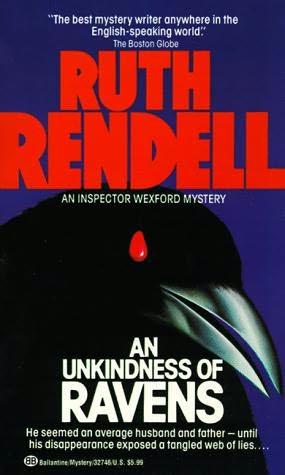
Title: An Unkindness of Ravens (Inspector Wexford #13)
Author: Ruth Rendell
Published: 1985
Category: Mystery – Police Procedural
Rating 3 out of 5
Add: Goodreads
Purchase: Amazon | IndieBound | Book Depository
Ravens are not particularly predatory birds, but neither are they soft and submissive. The collective noun for them is an “unkindness”…The raven is a symbol used by a feminist group whose attitude to the opposite sex is anything but soft and submissive. Detective Chief Inspector Wexford thought he was only doing a neighbourly good deed when he agreed to talk to Joy Williams about her missing husband. He didn’t expect to be investigating a homicide…
I actually hadn’t known that a group of ravens can be called an unkindness. It was my trivia for the day I started listening to An Unkindness of Ravens.
I’ve listened to and enjoyed a couple of others in this series and just picked this one up because my library had it available on audio. And maybe the title struck me.
Rodney Williams, the missing husband, of course ends up dead. But to be honest, he’s not a good guy, not evil just not remotely decent. He’s got plenty of secrets that hurt a several people when they come out. He’s not a man I could be sorry was dead, although he didn’t “deserve” it. It falls on Wexford and his sidekick, Burden, to discover who the killer was. As they pursue their investigation, other assaults on local men surface and Wexford is lead to a group of young, militant feminists, ARIA, whose symbol is a raven with a woman’s head.
First, Wexford. He’s a good character, intelligent, prone to quoting literature, has a philosophical bent. He follows the clues and his intuition, but isn’t overly judgemental in the process. In this one, though, I felt like he was a little slow on several things, twists that I could see coming before he seemed to. I don’t know if that’s because those particular plot points have come into use more than they had at the point when this was written or not. That said, I think he’s a great detective, and I like that we get glimpses of his family life, too.
Next, Burden. He’s remarried since the last story I listened to, and his wife is pregnant. I didn’t like this sidelight. If you read the story, you’ll probably understand why. The book is almost anti-feminist. Maybe it’s a warning about taking any movement too far, but Burden’s wife just bugged me. The young women I could understand, though not agree with all their points, but the wife was just flat-out wrong, and then Rendell lets her off the hook at the end.
Back to the actual plot. It moved at a good pace. This is not a quick mystery. It’s solved over months of looking at alibis, interviewing people, putting the pieces together, but it kept my attention. The clues are there and I did figure out who the killer was before it was announced, but that didn’t spoil my enjoyment of the story.
The good – characters and plot
The bad – the social commentary
Chief Inspector Wexford Series
- From Doon with Death
- A New Lease of Death (apa: Sins of the Fathers)
- Wolf to the Slaughter
- The Best Man To Die
- A Guilty Thing Surprised
- No More Dying Then
- Murder Being Once Done
- Some Lie and Some Die
- Shake Hands Forever
- A Sleeping Life
- Put on by Cunning (apa: Death Notes)
- The Speaker of Mandarin
- An Unkindness of Ravens
- The Veiled One
- Kissing the Gunner’s Daughter
- Simisola
- Road Rage
- Harm Done
- The Babes in the Wood
- End in Tears
- Not in the Flesh
- The Monster in the Box
- The Vault
Short Stories
- Means of Evil and Other Stories
Challenge: WAYR

I’d never heard an unkindness of ravens either. This sounds interesting but I don’t like too much social commentary in my books either.
You and all your long series books 😀
I know. I can’t seem to pull away from them.
I wonder if I would figure it out as well. I see ravens every day on my walks. they kinda scare me.
You’re in London, right? Another bit of raven trivia – a group of ravens that historically congregated around the Tower of London was referred to as a constable; they were thought to be ‘keeping watch’ over the monarchy